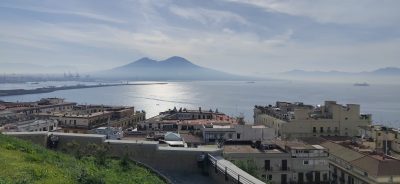
From May 12 to 16, the 2025 JOREK general meeting was held in Naples, Italy. Nicola Isernia and colleagues from the Federico II University of Naples organized the logistics for hosting the meeting. The meeting was held in the Federico II Congress Center, via Partenope, 36, just in front of the sea and below the wonderful lookout of Pizzofalcone and very close to the historical city center of Naples.
From our research group, Federico Cipolletta, participated in the event to share the work he performed in the JOREK code.

JOREK is an advanced HPC code capable of simulating plasma dynamics and the MHD instabilities that may occur in Nuclear Fusion devices. A large community of PhD students and researchers is involved in JOREK code development. The meeting was organized to report the status of the works with the JOREK code, divided into sessions identified by all the specific topics of interest. They consisted of kinetics analysis, physics of the pedestal, studies on disruption, efforts in numerics and code engineering, dynamics of runaway electrons, modeling of the plasma core, and efforts in modeling stellarators.
The EUROfusion Advanced Computing Hub hosted at the Barcelona Supercomputing Center (BSC) contributes to JOREK mainly in its numerics-related part, through the work of Federico Cipolletta, who reported the status of his efforts in optimizing the memory consumption in the JOREK-STARWALL and JOREK-CARIDDI couplings.

Apart from following the interesting and cutting-edge plasma physics topics covered, the meeting attendees had the opportunity to visit the National Archeological Museum of Naples (MANN) during a guided excursion organized by the local organizing committee. Among the vast collection of archeological findings, the museum also hosts the unique Farnese collection of colossal statues. The most representative ones are the Ercole and Toro Farnese, both originally from the ancient Bath of Caracalla of Rome.
|
|
|
The JOREK annual meeting is always a very nice way to keep the wide community of code developers in touch and to let the PhD students involved build their experience in reporting their findings to a heterogeneous audience of scientists. Such kind of events are very important to build the team and to increase the possibilities of connection between people living in several different locations.



